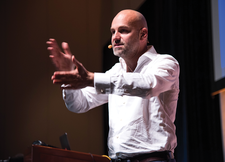Mark Shuttleworth talks about Canonical's next steps
Do Differently

We sat down with Mark Shuttleworth, the founder and CEO of Canonical, to talk about the future of Ubuntu and the company.
Canonical has sponsored the popular Ubuntu Linux since the founding of the Ubuntu project in 2004. Over the years, Ubuntu has become one of the most popular desktop operating systems, and Canonical has branched out into several other areas of the IT space. On the enterprise side, the company has emerged as the third major Linux vendor, alongside SUSE and Red Hat.
Over most of its history, Canonical has been a fixture in the consumer space, where it tried to establish Ubuntu as a viable alternative to Windows and almost succeeded. Canonical has also taken on big players like Apple and Google for a place in the phone market. The company has launched many in-house projects, including the Unity desktop, the MIR display server, and the Snap package environment.
Eventually, Shuttleworth and other Canonical leaders realized the company was trying to bite off more than it could chew, as it fought on simultaneous fronts with heavyweights such as Microsoft, Apple, Google, and Samsung. Canonical is now restructuring and is getting out of the consumer space to focus on the enterprise market.
[...]
Buy this article as PDF
(incl. VAT)
Buy Linux Magazine
Subscribe to our Linux Newsletters
Find Linux and Open Source Jobs
Subscribe to our ADMIN Newsletters
Support Our Work
Linux Magazine content is made possible with support from readers like you. Please consider contributing when you’ve found an article to be beneficial.

News
-
New Linux Botnet Discovered
The SSHStalker botnet uses IRC C2 to control systems via legacy Linux kernel exploits.
-
The Next Linux Kernel Turns 7.0
Linus Torvalds has announced that after Linux kernel 6.19, we'll finally reach the 7.0 iteration stage.
-
Linux From Scratch Drops SysVinit Support
LFS will no longer support SysVinit.
-
LibreOffice 26.2 Now Available
With new features, improvements, and bug fixes, LibreOffice 26.2 delivers a modern, polished office suite without compromise.
-
Linux Kernel Project Releases Project Continuity Document
What happens to Linux when there's no Linus? It's a question many of us have asked over the years, and it seems it's also on the minds of the Linux kernel project.
-
Mecha Systems Introduces Linux Handheld
Mecha Systems has revealed its Mecha Comet, a new handheld computer powered by – you guessed it – Linux.
-
MX Linux 25.1 Features Dual Init System ISO
The latest release of MX Linux caters to lovers of two different init systems and even offers instructions on how to transition.
-
Photoshop on Linux?
A developer has patched Wine so that it'll run specific versions of Photoshop that depend on Adobe Creative Cloud.
-
Linux Mint 22.3 Now Available with New Tools
Linux Mint 22.3 has been released with a pair of new tools for system admins and some pretty cool new features.
-
New Linux Malware Targets Cloud-Based Linux Installations
VoidLink, a new Linux malware, should be of real concern because of its stealth and customization.
